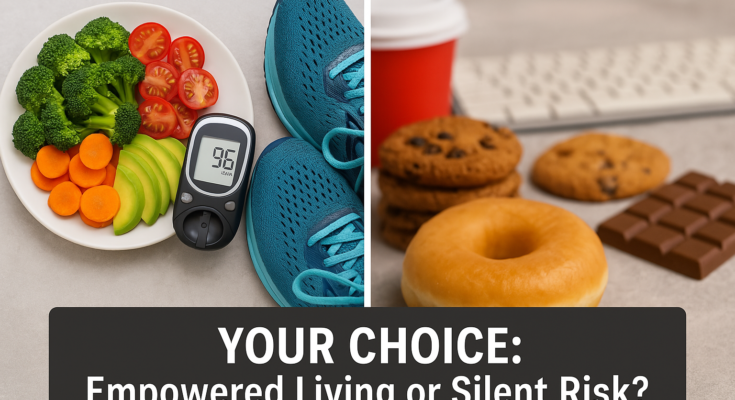Understanding Diabetes: A Global Health Journey from Causes to Empowerment
Diabetes isn’t just a condition—it’s a silent storm reshaping lives worldwide. Affecting over 537 million people, this metabolic disorder disrupts the body’s ability to manage blood sugar, turning everyday meals into potential challenges. But knowledge is power. Let’s unravel diabetes’ complexities, explore its types, and discover how to thrive while managing it.
What Is Diabetes?
Imagine your body as a finely tuned car. Glucose is its fuel, and insulin—a hormone made by the pancreas—is the key that unlocks cells to let that fuel in. Diabetes occurs when this system breaks down: either the body stops making insulin (Type 1) or ignores its signals (Type 2). The result? Sugar builds up in the bloodstream, sparking a cascade of health risks.
The Three Faces of Diabetes
1. Type 1 Diabetes: The Immune Misfire
- What Happens: The immune system attacks insulin-producing cells in the pancreas.
- Who’s Affected: Often diagnosed in children/young adults.
- Lifeline: Daily insulin injections or pumps are non-negotiable.
2. Type 2 Diabetes: A Modern Epidemic
- What Happens: Cells resist insulin, and the pancreas can’t keep up.
- Triggers: Obesity, sedentary lifestyles, and genetics play starring roles.
- Turning the Tide: Diet changes, exercise, and medications can often reverse early stages.
3. Gestational Diabetes: A Pregnancy Curveball
- What Happens: Hormonal shifts during pregnancy block insulin’s effects.
- Long-Term Risks: Moms and babies face higher odds of Type 2 later.
Why Does Diabetes Develop? Unmasking the Culprits
- Genes: Family history loads the gun; lifestyle pulls the trigger.
- Diet: Sugary drinks and processed foods flood the system with glucose.
- Inactivity: Muscles burn less sugar, leaving it to pool in the blood.
- Age & Stress: Over 45? Chronic stress? Both heighten risk.
Silent Alarms: Symptoms You Can’t Ignore
- Thirsty All the Time? Your kidneys work overtime to flush excess sugar, leaving you parched.
- Energy Crashes: Cells starve for fuel despite high blood sugar.
- Blurry Vision: Glucose swells eye lenses, distorting focus.
- Slow Healing: High sugar cripples immune cells and blood flow.
Diagnosis: Catching the Storm Early
- Fasting Blood Sugar Test: Over 126 mg/dL after 8 hours? Red flag.
- HbA1c Test: Averages blood sugar levels over 3 months. Ideal: under 5.7%.
- Oral Glucose Challenge: Drink a sugary solution, then track blood spikes.
Managing Diabetes: Your Toolkit for Control
1. Food as Medicine
- Eat the Rainbow: Fill half your plate with non-starchy veggies (spinach, broccoli).
- Smart Carbs: Choose quinoa over white bread; pair with protein to slow sugar spikes.
- Ditch Sugary Drinks: Swap soda for sparkling water with lime.
2. Move Like Your Life Depends on It (It Does!)
- 30 Minutes Daily: Walking, dancing, or yoga boosts insulin sensitivity.
- Strength Training: Muscles are glucose sponges—build them!
3. Medications & Tech
- Insulin Therapy: Pens, pumps, or patches for Type 1 and advanced Type 2.
- Metformin: Lowers liver glucose production for Type 2.
- CGMs: Continuous glucose monitors track trends 24/7.
4. Mindset Matters
- Stress Hacks: Meditation, journaling, or even knitting can lower cortisol.
- Support Groups: Connect with others navigating the same journey.
Complications: When Sugar Turns Toxic
Uncontrolled diabetes is a stealthy saboteur:
- Heart Attack/Stroke: High sugar damages blood vessels.
- Nerve Pain: Tingling feet? Numbness? Early signs of neuropathy.
- Vision Loss: Retina damage (retinopathy) is a leading cause of blindness.
- Kidney Failure: Filtering organs drown in excess glucose.
Prevention: Writing a Healthier Future
- Walk After Meals: A 10-minute stroll lowers post-meal blood sugar.
- Sleep Like a Baby: Poor sleep spikes insulin resistance. Aim for 7-8 hours.
- Screen Early: Annual checks if you’re overweight or have a family history.



An interesting dialogue is value comment. I feel that you should write more on this subject, it might not be a taboo subject however typically persons are not sufficient to speak on such topics. To the next.